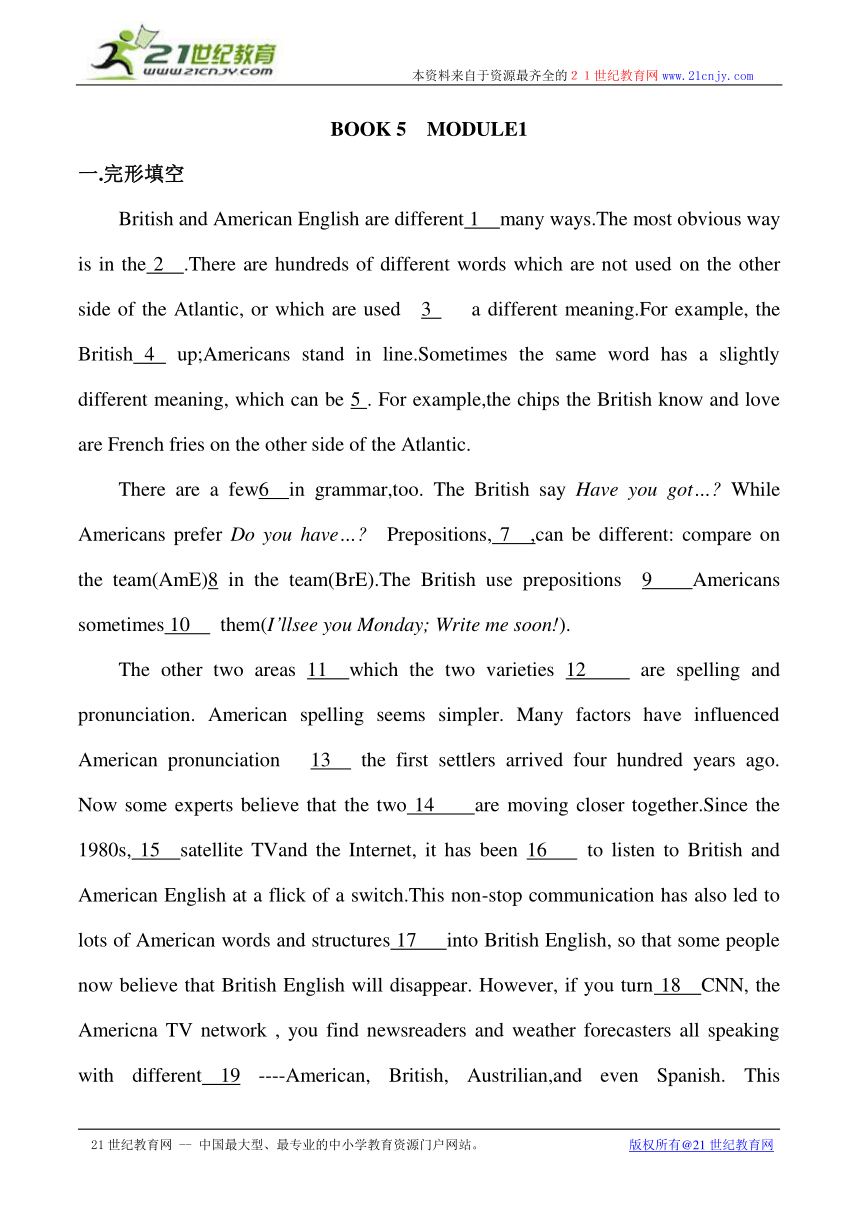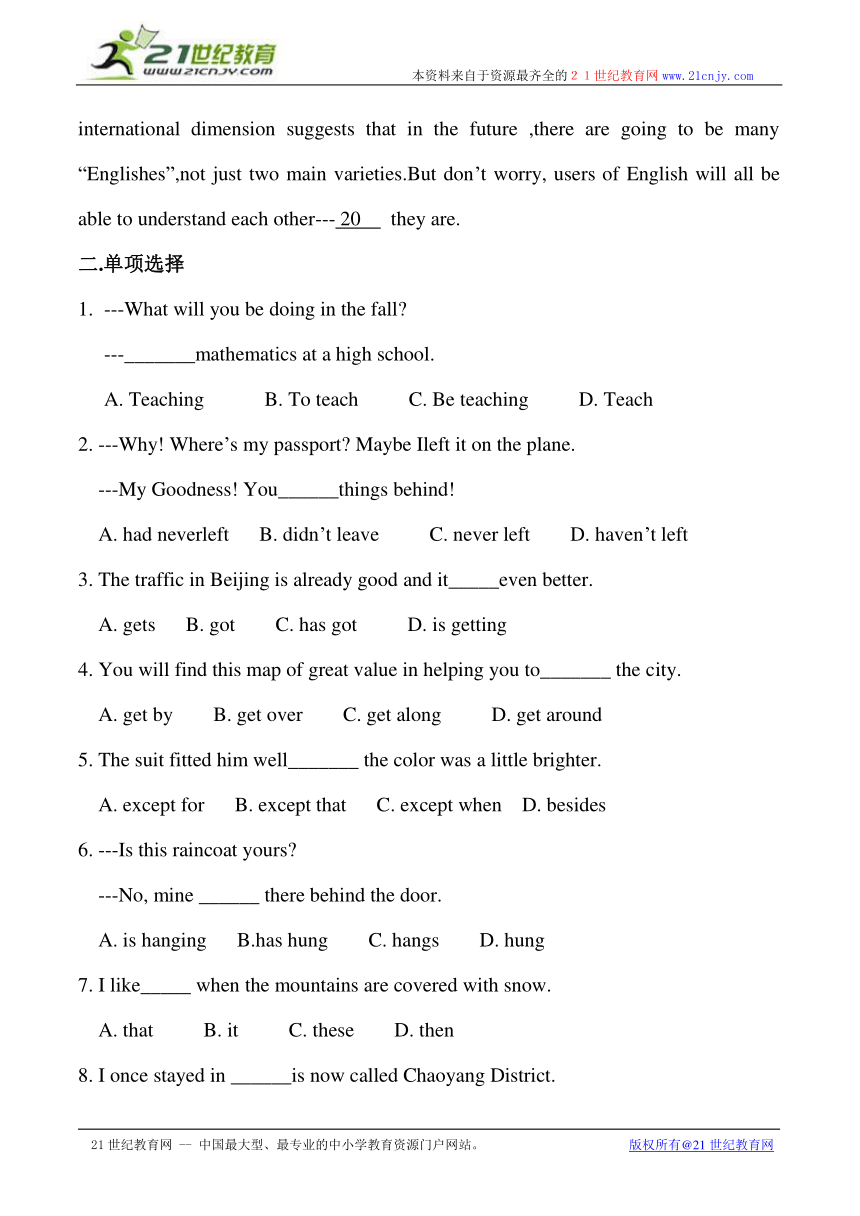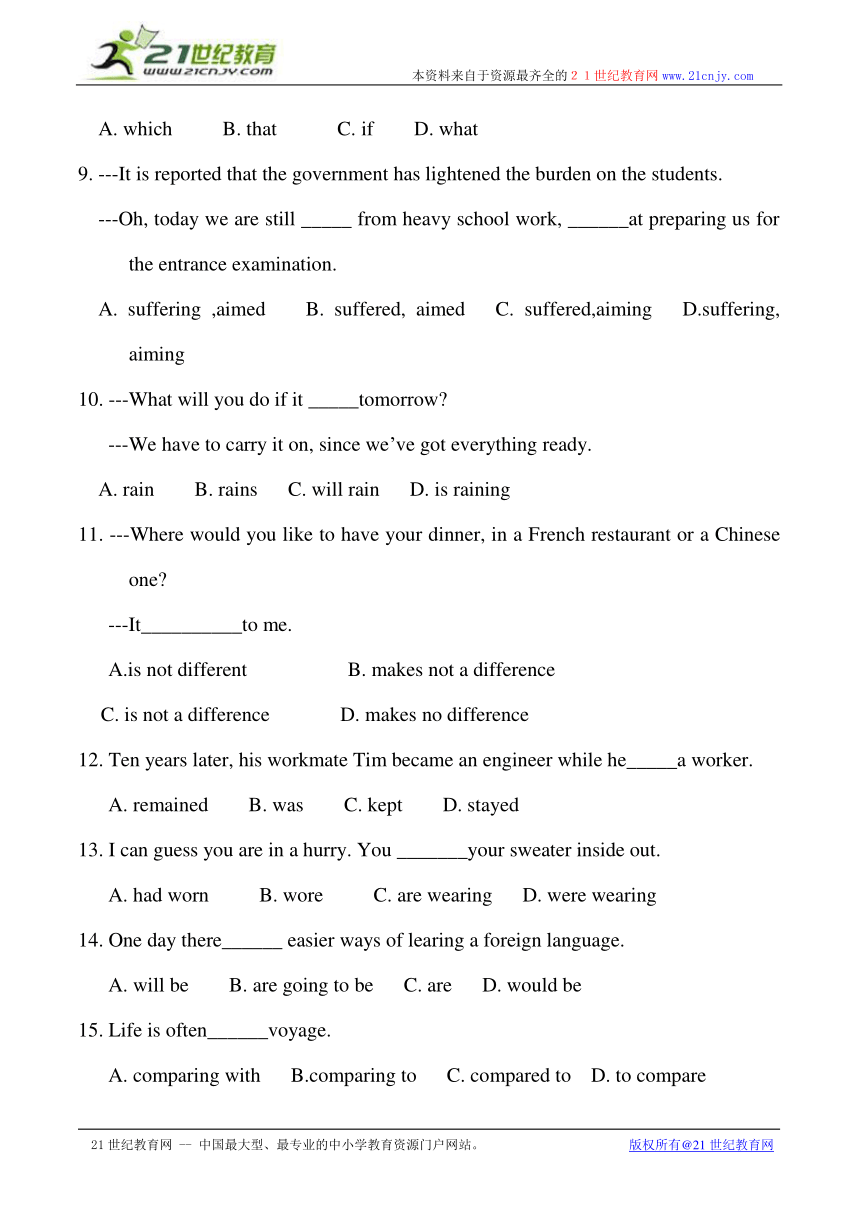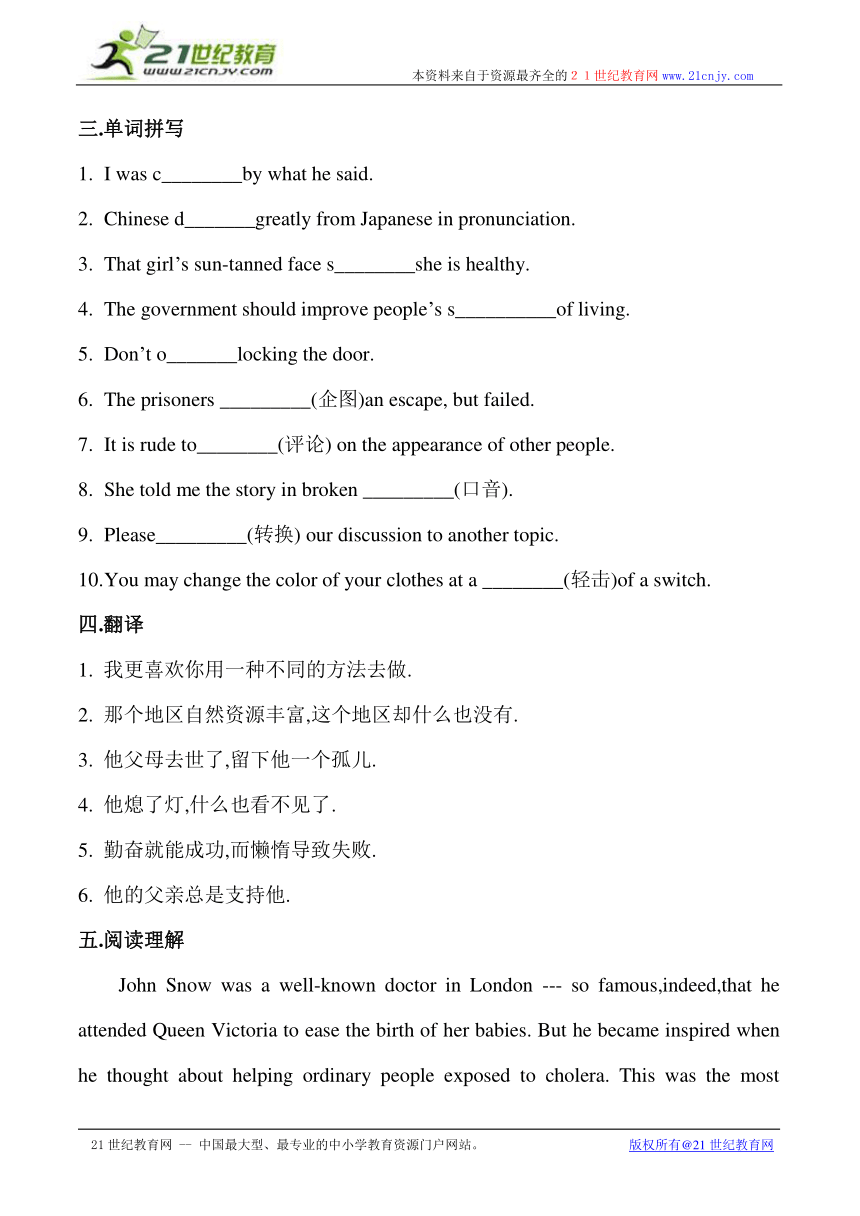Module 1 British and American English
文档属性
| 名称 | Module 1 British and American English |  | |
| 格式 | rar | ||
| 文件大小 | 18.1KB | ||
| 资源类型 | 教案 | ||
| 版本资源 | 外研版 | ||
| 科目 | 英语 | ||
| 更新时间 | 2009-02-24 18:17:00 | ||
图片预览




文档简介
BOOK 5 MODULE1
一.完形填空
British and American English are different 1 many ways.The most obvious way is in the 2 .There are hundreds of different words which are not used on the other side of the Atlantic, or which are used 3 a different meaning.For example, the British 4 up;Americans stand in line.Sometimes the same word has a slightly different meaning, which can be 5 . For example,the chips the British know and love are French fries on the other side of the Atlantic.
There are a few6 in grammar,too. The British say Have you got…? While Americans prefer Do you have…? Prepositions, 7 ,can be different: compare on the team(AmE)8 in the team(BrE).The British use prepositions 9 Americans sometimes 10 them(I’llsee you Monday; Write me soon!).
The other two areas 11 which the two varieties 12 are spelling and pronunciation. American spelling seems simpler. Many factors have influenced American pronunciation 13 the first settlers arrived four hundred years ago. Now some experts believe that the two 14 are moving closer together.Since the 1980s, 15 satellite TVand the Internet, it has been 16 to listen to British and American English at a flick of a switch.This non-stop communication has also led to lots of American words and structures 17 into British English, so that some people now believe that British English will disappear. However, if you turn 18 CNN, the Americna TV network , you find newsreaders and weather forecasters all speaking with different 19 ----American, British, Austrilian,and even Spanish. This international dimension suggests that in the future ,there are going to be many “Englishes”,not just two main varieties.But don’t worry, users of English will all be able to understand each other--- 20 they are.
二.单项选择
---What will you be doing in the fall?
---_______mathematics at a high school.
A. Teaching B. To teach C. Be teaching D. Teach
2. ---Why! Where’s my passport? Maybe Ileft it on the plane.
---My Goodness! You______things behind!
A. had neverleft B. didn’t leave C. never left D. haven’t left
3. The traffic in Beijing is already good and it_____even better.
A. gets B. got C. has got D. is getting
4. You will find this map of great value in helping you to_______ the city.
A. get by B. get over C. get along D. get around
5. The suit fitted him well_______ the color was a little brighter.
A. except for B. except that C. except when D. besides
6. ---Is this raincoat yours?
---No, mine ______ there behind the door. A. is hanging B.has hung C. hangs D. hung
7. I like_____ when the mountains are covered with snow.
A. that B. it C. these D. then
8. I once stayed in ______is now called Chaoyang District.
A. which B. that C. if D. what
9. ---It is reported that the government has lightened the burden on the students.
---Oh, today we are still _____ from heavy school work, ______at preparing us for the entrance examination.
A. suffering ,aimed B. suffered, aimed C. suffered,aiming D.suffering, aiming
10. ---What will you do if it _____tomorrow?
---We have to carry it on, since we’ve got everything ready.
A. rain B. rains C. will rain D. is raining
11. ---Where would you like to have your dinner, in a French restaurant or a Chinese one?
---It__________to me.
A.is not different B. makes not a difference
C. is not a difference D. makes no difference
12. Ten years later, his workmate Tim became an engineer while he_____a worker.
A. remained B. was C. kept D. stayed
13. I can guess you are in a hurry. You _______your sweater inside out.
A. had worn B. wore C. are wearing D. were wearing
14. One day there______ easier ways of learing a foreign language.
A. will be B. are going to be C. are D. would be
15. Life is often______voyage.
A. comparing with B.comparing to C. compared to D. to compare
三.单词拼写
I was c________by what he said.
Chinese d_______greatly from Japanese in pronunciation.
That girl’s sun-tanned face s________she is healthy.
The government should improve people’s s__________of living.
Don’t o_______locking the door.
The prisoners _________(企图)an escape, but failed.
It is rude to________(评论) on the appearance of other people.
She told me the story in broken _________(口音).
Please_________(转换) our discussion to another topic.
You may change the color of your clothes at a ________(轻击)of a switch.
四.翻译
1. 我更喜欢你用一种不同的方法去做.
2. 那个地区自然资源丰富,这个地区却什么也没有.
3. 他父母去世了,留下他一个孤儿.
4. 他熄了灯,什么也看不见了.
5. 勤奋就能成功,而懒惰导致失败.
6. 他的父亲总是支持他.
五.阅读理解
John Snow was a well-known doctor in London --- so famous,indeed,that he attended Queen Victoria to ease the birth of her babies. But he became inspired when he thought about helping ordinary people exposed to cholera. This was the most deadly disease of its day. Neither its cause, nor its cure was understood. So many thousands of terrified people died every time there was an outbreak. John Snow wanted to use his knowledge to help solve this problem. He knew it would never be controlled until its cause was found.
He got interested in two theories explaining how cholera killed people. The first suggested that cholera multiplied in the air without reason. A cloud of dangerous gas would float around until it found its victims. The second suggested that people absorbed this disease into their bodies with their meals. From the stomach the disease attacked the body quickly and soon the affected person was dead.
He believed in the second theory but needed to prove he was correct. So when another outbreak hit London in 1854, John Snow was ready to test these two theories. As the disease spread quickly through the poor neighbourhoods, John Snow begin to gather the information. He found that in two particular streets, the cholera outbreak was so severe that more than 500 people had died in 10 days. He determined to find out why. He marked on a map where all the dead people had lived. Here it is:The map gave a valuable clue about the cause of the disease. Many of the deaths were near the water pump in Broad Street (especially numbers 16,37,38and40Broad Street).John Snow also saw that some houses (Such as 20 and 21Broad Street and8 and 9 Cambridge Street) had had no deaths. He discovered that these families worked in the pub at 7CambridgeStreet. They were given free beer and so had not drunk the water from the Broad Street pump. It seemed that the water was to blame.
Next, John Snow looked into the source of the water for these two streets. He found that it came from the river, which had been polluted by the dirty water from London. Immediately John Snow told the astonished people in Broad Street to remove the handle from the water pump so it could not be used.
Soon the disease began to slow down. John Snow had shown that cholera was spread by germs and not in a cloud of gas. In addition, he found two other deaths in another part of London that were linked to the Broad Street outbreak. A woman, who had moved away from Broad street, liked the water so much that she had had it delivered from the pump to her house every day. Both she and her daughter, who often visited her,died of cholera after drinking the water. With this extra evidence John Snow was able to announce with certainty that polluted water carried the disease.
To prevent this from happening again, John Snow suggested that the source of all water supplies be examined and new methods of dealing with polluted water be found. The water companies were also instructed not to expose people to polluted water anymore. Finally “King Cholera” was defeated.
“T” or ”F”
1. Although people knew the cause of cholera, they couldn’t cure it at that time.
2. The first theory suggested that people absorbed this disease into their bodies with their meals
3. When another outbreak hit London in 1854, John Snow was ready to test these theories.
4. The cholera outbreak was so severe that more than 5000 people had died in 10 days.
5. The map gave a valuable clue about the cause of the disease.
6. Some houses (such as 20 and 21 Broad Street and 8 and 9 Cambridge Street) had had no deaths because they had drunk less water.
7. John snow found the water came from a polluted river.
8. Thanks to John Snow, “King Cholera” was defeated.
六.重点词汇
ease 减轻,舒缓
We eased her mind by telling her that she would soon get better.
我们告诉她,她很快就会好起来的,来缓解她心中的忧虑.
The drawer in my desk was fast stuck but I eased it open with a knife.
我书桌的抽屉卡得很紧,我用小刀使它松动后打开了.
expose to暴露,受到风险
Don’t expose yourself to the sunfor too long.You’ll get sunburned.
别在太阳下晒得太久,你会被晒伤.
It’s very dangerous to be exposed to these viruses without any protection. 不加任何保护,直接暴露在这些病毒下是十分危险的.
absorb…into…吸收
The big company has gradually absorbed these small companies into its own organization.
这家大公司渐渐把这些小公司吞并了.
I was so interested in these new ideas that I absorbed them without thinking.
我对这些新观念非常感兴趣,甚至于不求甚解的吸收了
in addition (to) 此外(还)
In addition , the course also provides practical experience.
此外,这门课程还提供了实践的经验..
We saw a Mickey Mouse cartoon in addition to the cowboy movie.
我们除了西部牛仔片之外还看了一个米老鼠动画片
link …to…把...与...连接,联系
Fingerprints linked the suspect to the crime. 指纹证实了嫌疑犯的犯罪行为.
Keys:
一.完形填空
1. in 2. vacabulary 3.with 4. queue 5. confusing 6. differences 7. too 8. with 9. where 10. omit 11. in 12. differ 13. since 14. varieties 15. with 16. possible 17. passing 18. on 19. accents 20. wherever
二.单项选择
1—5 ACDDB 6—10 ABDDB 11—15 DACAC
三.单词拼写
1. confused 2. differs 3. suggests 4. standard 5. omit
6. attempted 7. remark 8. accent 9. switch 10. flick
四.翻译
1. I prefer you to do it in a different way.
2. That region has plenty of natural resources while this one has none.
3. His parents died,leaving him an orphan.
4. He turned off the light, seeing nothing.
5. Hard work leads to success, while laziness leads to failure.
6. His father is always in favor of him
五.阅读
1.F 2.F 3.T 4.F 5.T 6. F 7. T 8. T
一.完形填空
British and American English are different 1 many ways.The most obvious way is in the 2 .There are hundreds of different words which are not used on the other side of the Atlantic, or which are used 3 a different meaning.For example, the British 4 up;Americans stand in line.Sometimes the same word has a slightly different meaning, which can be 5 . For example,the chips the British know and love are French fries on the other side of the Atlantic.
There are a few6 in grammar,too. The British say Have you got…? While Americans prefer Do you have…? Prepositions, 7 ,can be different: compare on the team(AmE)8 in the team(BrE).The British use prepositions 9 Americans sometimes 10 them(I’llsee you Monday; Write me soon!).
The other two areas 11 which the two varieties 12 are spelling and pronunciation. American spelling seems simpler. Many factors have influenced American pronunciation 13 the first settlers arrived four hundred years ago. Now some experts believe that the two 14 are moving closer together.Since the 1980s, 15 satellite TVand the Internet, it has been 16 to listen to British and American English at a flick of a switch.This non-stop communication has also led to lots of American words and structures 17 into British English, so that some people now believe that British English will disappear. However, if you turn 18 CNN, the Americna TV network , you find newsreaders and weather forecasters all speaking with different 19 ----American, British, Austrilian,and even Spanish. This international dimension suggests that in the future ,there are going to be many “Englishes”,not just two main varieties.But don’t worry, users of English will all be able to understand each other--- 20 they are.
二.单项选择
---What will you be doing in the fall?
---_______mathematics at a high school.
A. Teaching B. To teach C. Be teaching D. Teach
2. ---Why! Where’s my passport? Maybe Ileft it on the plane.
---My Goodness! You______things behind!
A. had neverleft B. didn’t leave C. never left D. haven’t left
3. The traffic in Beijing is already good and it_____even better.
A. gets B. got C. has got D. is getting
4. You will find this map of great value in helping you to_______ the city.
A. get by B. get over C. get along D. get around
5. The suit fitted him well_______ the color was a little brighter.
A. except for B. except that C. except when D. besides
6. ---Is this raincoat yours?
---No, mine ______ there behind the door. A. is hanging B.has hung C. hangs D. hung
7. I like_____ when the mountains are covered with snow.
A. that B. it C. these D. then
8. I once stayed in ______is now called Chaoyang District.
A. which B. that C. if D. what
9. ---It is reported that the government has lightened the burden on the students.
---Oh, today we are still _____ from heavy school work, ______at preparing us for the entrance examination.
A. suffering ,aimed B. suffered, aimed C. suffered,aiming D.suffering, aiming
10. ---What will you do if it _____tomorrow?
---We have to carry it on, since we’ve got everything ready.
A. rain B. rains C. will rain D. is raining
11. ---Where would you like to have your dinner, in a French restaurant or a Chinese one?
---It__________to me.
A.is not different B. makes not a difference
C. is not a difference D. makes no difference
12. Ten years later, his workmate Tim became an engineer while he_____a worker.
A. remained B. was C. kept D. stayed
13. I can guess you are in a hurry. You _______your sweater inside out.
A. had worn B. wore C. are wearing D. were wearing
14. One day there______ easier ways of learing a foreign language.
A. will be B. are going to be C. are D. would be
15. Life is often______voyage.
A. comparing with B.comparing to C. compared to D. to compare
三.单词拼写
I was c________by what he said.
Chinese d_______greatly from Japanese in pronunciation.
That girl’s sun-tanned face s________she is healthy.
The government should improve people’s s__________of living.
Don’t o_______locking the door.
The prisoners _________(企图)an escape, but failed.
It is rude to________(评论) on the appearance of other people.
She told me the story in broken _________(口音).
Please_________(转换) our discussion to another topic.
You may change the color of your clothes at a ________(轻击)of a switch.
四.翻译
1. 我更喜欢你用一种不同的方法去做.
2. 那个地区自然资源丰富,这个地区却什么也没有.
3. 他父母去世了,留下他一个孤儿.
4. 他熄了灯,什么也看不见了.
5. 勤奋就能成功,而懒惰导致失败.
6. 他的父亲总是支持他.
五.阅读理解
John Snow was a well-known doctor in London --- so famous,indeed,that he attended Queen Victoria to ease the birth of her babies. But he became inspired when he thought about helping ordinary people exposed to cholera. This was the most deadly disease of its day. Neither its cause, nor its cure was understood. So many thousands of terrified people died every time there was an outbreak. John Snow wanted to use his knowledge to help solve this problem. He knew it would never be controlled until its cause was found.
He got interested in two theories explaining how cholera killed people. The first suggested that cholera multiplied in the air without reason. A cloud of dangerous gas would float around until it found its victims. The second suggested that people absorbed this disease into their bodies with their meals. From the stomach the disease attacked the body quickly and soon the affected person was dead.
He believed in the second theory but needed to prove he was correct. So when another outbreak hit London in 1854, John Snow was ready to test these two theories. As the disease spread quickly through the poor neighbourhoods, John Snow begin to gather the information. He found that in two particular streets, the cholera outbreak was so severe that more than 500 people had died in 10 days. He determined to find out why. He marked on a map where all the dead people had lived. Here it is:The map gave a valuable clue about the cause of the disease. Many of the deaths were near the water pump in Broad Street (especially numbers 16,37,38and40Broad Street).John Snow also saw that some houses (Such as 20 and 21Broad Street and8 and 9 Cambridge Street) had had no deaths. He discovered that these families worked in the pub at 7CambridgeStreet. They were given free beer and so had not drunk the water from the Broad Street pump. It seemed that the water was to blame.
Next, John Snow looked into the source of the water for these two streets. He found that it came from the river, which had been polluted by the dirty water from London. Immediately John Snow told the astonished people in Broad Street to remove the handle from the water pump so it could not be used.
Soon the disease began to slow down. John Snow had shown that cholera was spread by germs and not in a cloud of gas. In addition, he found two other deaths in another part of London that were linked to the Broad Street outbreak. A woman, who had moved away from Broad street, liked the water so much that she had had it delivered from the pump to her house every day. Both she and her daughter, who often visited her,died of cholera after drinking the water. With this extra evidence John Snow was able to announce with certainty that polluted water carried the disease.
To prevent this from happening again, John Snow suggested that the source of all water supplies be examined and new methods of dealing with polluted water be found. The water companies were also instructed not to expose people to polluted water anymore. Finally “King Cholera” was defeated.
“T” or ”F”
1. Although people knew the cause of cholera, they couldn’t cure it at that time.
2. The first theory suggested that people absorbed this disease into their bodies with their meals
3. When another outbreak hit London in 1854, John Snow was ready to test these theories.
4. The cholera outbreak was so severe that more than 5000 people had died in 10 days.
5. The map gave a valuable clue about the cause of the disease.
6. Some houses (such as 20 and 21 Broad Street and 8 and 9 Cambridge Street) had had no deaths because they had drunk less water.
7. John snow found the water came from a polluted river.
8. Thanks to John Snow, “King Cholera” was defeated.
六.重点词汇
ease 减轻,舒缓
We eased her mind by telling her that she would soon get better.
我们告诉她,她很快就会好起来的,来缓解她心中的忧虑.
The drawer in my desk was fast stuck but I eased it open with a knife.
我书桌的抽屉卡得很紧,我用小刀使它松动后打开了.
expose to暴露,受到风险
Don’t expose yourself to the sunfor too long.You’ll get sunburned.
别在太阳下晒得太久,你会被晒伤.
It’s very dangerous to be exposed to these viruses without any protection. 不加任何保护,直接暴露在这些病毒下是十分危险的.
absorb…into…吸收
The big company has gradually absorbed these small companies into its own organization.
这家大公司渐渐把这些小公司吞并了.
I was so interested in these new ideas that I absorbed them without thinking.
我对这些新观念非常感兴趣,甚至于不求甚解的吸收了
in addition (to) 此外(还)
In addition , the course also provides practical experience.
此外,这门课程还提供了实践的经验..
We saw a Mickey Mouse cartoon in addition to the cowboy movie.
我们除了西部牛仔片之外还看了一个米老鼠动画片
link …to…把...与...连接,联系
Fingerprints linked the suspect to the crime. 指纹证实了嫌疑犯的犯罪行为.
Keys:
一.完形填空
1. in 2. vacabulary 3.with 4. queue 5. confusing 6. differences 7. too 8. with 9. where 10. omit 11. in 12. differ 13. since 14. varieties 15. with 16. possible 17. passing 18. on 19. accents 20. wherever
二.单项选择
1—5 ACDDB 6—10 ABDDB 11—15 DACAC
三.单词拼写
1. confused 2. differs 3. suggests 4. standard 5. omit
6. attempted 7. remark 8. accent 9. switch 10. flick
四.翻译
1. I prefer you to do it in a different way.
2. That region has plenty of natural resources while this one has none.
3. His parents died,leaving him an orphan.
4. He turned off the light, seeing nothing.
5. Hard work leads to success, while laziness leads to failure.
6. His father is always in favor of him
五.阅读
1.F 2.F 3.T 4.F 5.T 6. F 7. T 8. T
